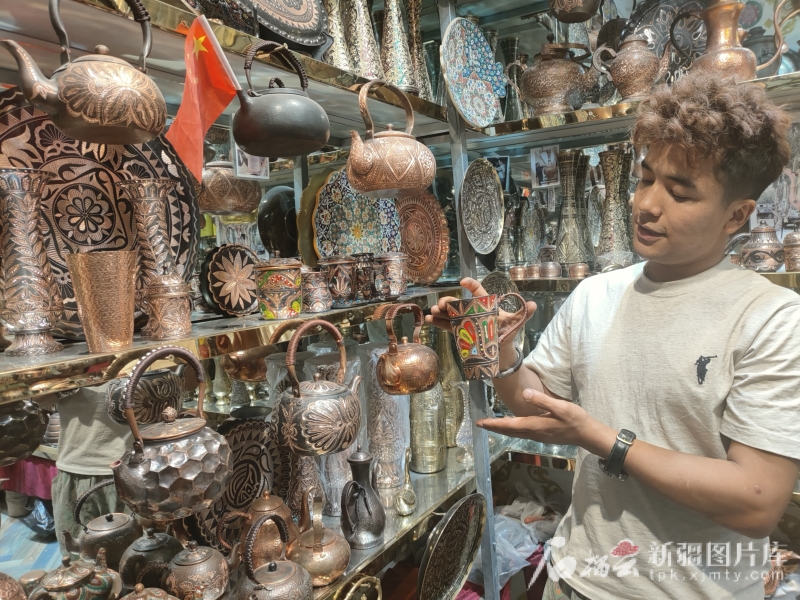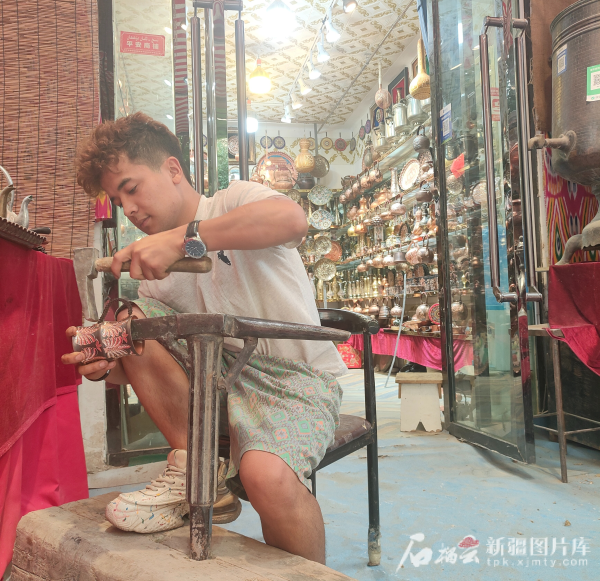Shiliuyun-Xinjiang Daily (Reporter Jazila Nysbek) news: “The sound of a hammer striking copper lulls me to sleep—it even cures my insomnia!” said 21-year-old Abudukeyoumu Aili with a shy smile.
He and his older brother, Abudureyimu Aili, are sixth-generation inheritors of Kashi’s copperware craftsmanship, a skill they began learning from their grandfather and father as children.

Photo taken on May 23, 2025 shows Abudukeyoumu Aili introduces new products at their shop in the ancient city of Kashi, Kashi Prefecture, northwest China’s Xinjiang Uygur Autonomous Region. (Photo by Jazila Nysbek)
On the afternoon of May 23, 2025, Abudukeyoumu sat at the entrance of their shop in the ancient city of Kashi, Kashi Prefecture, northwest China’s Xinjiang Uygur Autonomous Region, carefully attaching a handle to a copper coffee cup. His hammer tapped rhythmically, avoiding the intricate engravings already carved into the surface. “This is our latest design. Once colored, it’ll be stunning—customers love it!” he explained.
A photograph hanging outside the shop, taken 14 years ago, captures a cherished memory: a 7-year-old Abudukeyoumu posing with his grandfather, father, brother, younger sibling, and apprentices in front of the family’s old workshop. Today, their production workshop has moved outside the bustling tourist area to avoid safety risks from sparks, while the shop inside the scenic area focuses on sales.
“My brother, who’s two years older, started learning from our father first. I mostly watched and helped until I was 10,” Abudukeyoumu recalled.
Though their father passed away early, he left behind a complete legacy of craftsmanship. Now, the brothers have mastered every step—cutting, shaping, quenching, polishing, engraving, and sanding—and can even craft custom designs based solely on a customer’s description.
The clinking of hammers on copper defined Abudukeyoumu’s childhood and guided him to his life’s passion. “I never felt pressured to inherit this craft. But the more I worked on it, the more I fell in love,” he said. What drives him is the pride of transforming raw copper sheets into exquisite art.
“Even the smallest piece requires hundreds of hammer strikes,” he emphasized. “I tried other jobs but realized my father’s craft was my true calling.”

Photo taken on May 23, 2025 shows Abudukeyoumu Aili fixes the handle for a coffee cup in front of their shop in the ancient city of Kashi, Kashi Prefecture, northwest China’s Xinjiang Uygur Autonomous Region. (Photo by Jazila Nysbek)
Support from tourists from across China and beyond and Kashi’s revitalization as a cultural hub have bolstered their resolve. Over 60 copperware shops in the ancient city now preserve traditional techniques, with 40 bearing “intangible cultural heritage” plaques.
Once supplying restaurants across Xinjiang, the brothers now thrive on retail sales to visitors nationwide. They innovate with products like desert-style coffee brewers and leverage social media to showcase their craft, with revenue hitting nearly 200,000 yuan (about 27,828 U.S. dollars) in the first four months of this year alone.
“The giant copper teapot at the entrance of the ancient city of Kashi, only our family can make that,” Abudukeyoumu said proudly. “We’ve even received orders from fellow artisans. This ancient craft is giving us a modern, prosperous life.”
(A written permission shall be obtained for reprinting, excerpting, copying and mirroring of the contents published on this website. Unauthorized aforementioned act shall be deemed an infringement, of which the actor shall be held accountable under the law.)









